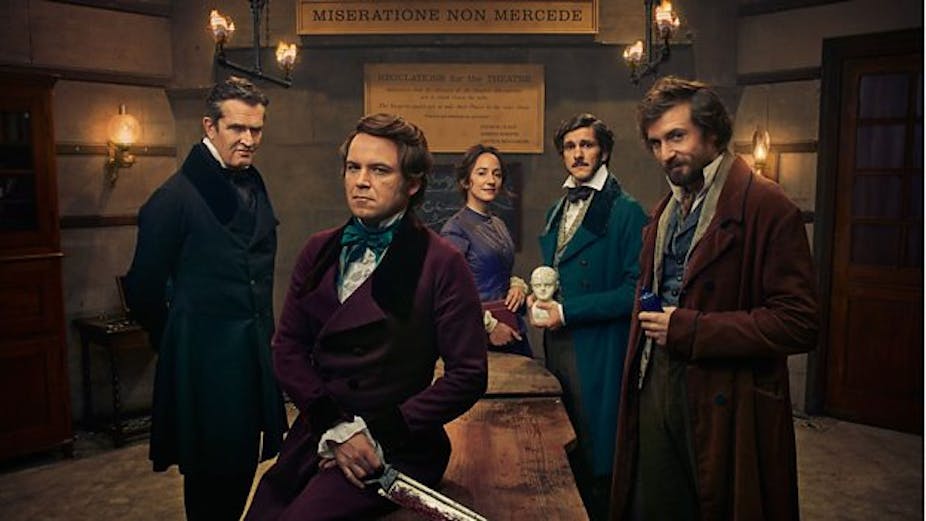The Victorian doctors portrayed in new BBC series, Quacks, may seem outré, but my own research reveals that the creator, James Woods, got them pretty spot on.
The comedy-drama portrays the blood-spattered doctors as self-styled “great men”, while also exposing the dangers of early medical innovation. Nineteenth-century patients are, for the purposes of entertainment, shown as subject to the gory, ludicrous or poignant experiments of their practitioners. Attention is also turned on the doctors themselves and their responses to their own failings.
There is certainly ample evidence in historical research that medical men were flawed human beings, at the same time that they aspired to greatness.
The character of the dentist played by Tom Basden is shown early in the series as being in debt and threatened by money-lenders. Financial difficulty was the most common and visible failing among not just dentists, but doctors of all stripes. Sometimes this arose from the pressure to live well and spend confidently in order to inspire confidence in paying patients. Others made unwise investments in either business or science, such as Herman Ayckbourn who spent £300 trying (and failing) to develop a method for the artificial incubation of duck eggs. His creditors were not impressed.
Drugged doctors

In Quacks, the dentist and his medical friends are also seen casually drinking opium or “cocaine wine”. Self-dosing by Victorian doctors has been recognised for a long time, but not always in line with its fatal potential. Men did not just stick to opium or laudanum, but also used chloral (to aid sleep) and even the dangerous poison prussic acid or cyanide, apparently to sober themselves up.
Self-dosing with poison while drunk inevitably resulted in doctors’ deaths, not least because they might mistake poison for something else. In 1876, tipsy doctor Charles Porter was supposed to be drinking the ginger beer brought for him by his wife, but on closer scrutiny he had picked up the wrong bottle. He was heard to say, “If this is prussic acid, I am a dead man,” – which, indeed, he soon was.
The “alienist” character played by Matthew Baynton is described as a “mad doctor” on the basis of his specialism in mental health, but doctors might also find themselves committed to an asylum. Their drug use might have spilled over into addiction, as was probably the case for real-life-character Charles Grimes, who was tried at the Old Bailey for shooting a policeman while under the influence of opium and alcohol, and was placed in Broadmoor.
Professional stress was often overwhelming. Frederick Wright was admitted to the Derby asylum in 1856 after threatening his fellow town doctors with violence. He thought they were conspiring to ruin his practice. He was never discharged and died in an asylum 24 years later.
Vulnerable doctors
The “alienist” also dabbles in phrenology, the briefly-fashionable idea that people’s character might be represented by the shape and indentations on their skull. In Quacks, the doctor is sexually aroused by feeling the head of a colleague’s wife.
Victorian doctors were much more likely to be worried, though, about their patients being aroused by them. The fear was that chemical anaesthetic would have a potent influence particularly on female patients, who might then undergo sexual delusions and accuse their doctor of assault.
Evidence suggests that doctors were more likely than their middle-class peers to be successfully accused of sexual assault on female patients, and the fear that they would be prosecuted might induce high levels of anxiety or despair. William Whitfield Edwards committed suicide in December 1882 after an allegation of kissing his patient.
Quacks finds a humorous way to remind us that even supposedly great doctors were humans, too, with disappointing marriages, career mistakes and less-than-great personal habits. There is a serious point here as well: it is inevitable that doctors will fail sometimes, because they are human. This does not mean that we should accept unethical or criminal doctors without protest. It does remind us, however, that medical men and women must be allowed to be human first and professionals second.

